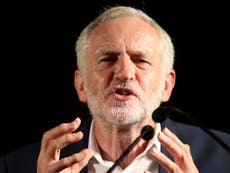Hilariously, Jeremy Corbyn’s plans for a brave new digital future are being fronted by the technologically inept
One of the proposals in Corbyn’s manifesto would be to end ‘unjustified surveillance by CCTV’, he said. Those of us who got the reference to Richard Branson’s use of footage from CCTV on a Virgin train to attack the Labour leader could only applaud inwardly

My heart lifted when I received the email from the Jeremy For Labour press team. It said that the candidate for the Labour leadership was going to launch a policy to “democratise the internet” today. Long overdue, given the stranglehold on online debate maintained by corporate interests and the mainstream media.
There followed a list of proposals, ranging from mother pie to applehood, although the appendices of unintended consequences and how the vast cost would be met had been left off my version. In addition someone who couldn’t format bullet points in an email seems to have written the list, which was an ingenious way of expressing solidarity with of those of us for whom new technology is a struggle.

But best of all was the location for the event, a place called Newspeak House in Shoreditch. The place is an alternative venue set up by Ed Saperia, who worked on the Green Party’s 2015 election campaign, and who is apparently an admirer of Nineteen Eighty-Four by George Orwell. It was a doubleplusgood place to launch a policy on, among other things, the civil liberties implications of new technology.
Indeed, one of the more surprising proposals was to renew Tony Blair’s attempt to bring in identity cards. Naturally, Jeremy For Corbyn doesn’t call it that. It calls it a digital citizen passport. This was the most important part of the identity card scheme, and the only part that was left by the time the rest of it was dismantled: a voluntary scheme to give anyone a unique identity online that can be used across government departments.
It is such a good idea that it is already up and running, operated by this wicked Tory regime, called the Government Gateway, but it is the thought that counts, and the attempt to reach across the Labour Party to build bridges with “red Tories”, “scum” and other lackeys of the running dogs of Portlandism.
At the event, the candidate himself boisterously took the fight to those of his critics who say that he sometimes comes across as lacking a sense of humour. One of the proposals in his Digital Democracy Manifesto would be to end “unjustified surveillance by CCTV”, he said. Those of us who got the reference to Richard Branson’s use of footage from CCTV on a Virgin train to attack the Labour leader could only applaud inwardly. Or would have done if the live video stream from the event hadn’t gone down.
I, for one, admire Jeremy Corbyn’s attempt to restore the glory days of Windows 95, when the Internet was swashbuckling and free and people spelled online with a hyphen. I share his vision of the information superhighway, based on high-speed dial-up for all. In particular, I like his idea for an Open Knowledge Library: if only someone could think of a catchy name for millions of computers all over the world, all connected to each other and sharing information without charge.



Join our commenting forum
Join thought-provoking conversations, follow other Independent readers and see their replies